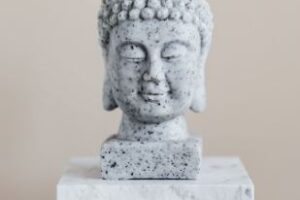
When you get sick, you just get sick; when you die, you just die. — Matsuoka Roshi
This saying, which is probably not original with O-Sensei, but a traditional aphorism, is one he repeated enough to indicate its importance to him, and its relevance to Zen. Of course, he would also encourage us to visit the doctor and do what the doctor tells us, illustrating the pragmatic side of the Middle Way, balancing out the seemingly brutal, uncompromising embrace of our mortal fate, and the final futility of resistance. He also made clear that adopting this attitude in the midst of illness, or when faced with death, can also have the practical benefit of preventing making it worse on ourselves, and, in the case of disease, perhaps even helping with the recovery. Or prolonging life by not aggravating an incurable condition.
… as some wag once said, the number one cause of death is birth.
zenkai taiun michael elliston, roshi
In any case, amongst the three dimensions of dukkha of classical Buddhism — aging (last month’s Dharma Byte), sickness and death, sickness is perhaps more fearful and more to-be-avoided than the others. Birth rounds out the four, actually, though we do not usually regard it as a form of suffering, ironically. After all, as some wag once said, the number one cause of death is birth.
Aged people will often tell you that it is not dying that they worry about, but the process of dying, especially if it involves extended suffering from sickness and pain. Those who find themselves confined to a sick bed, which threatens to become their deathbed, strung up with tubes and machines keeping them alive, often prefer to end their own life, rather than waiting for the inevitable “natural” death as dictated by nature. The extreme efforts to sustain life at any cost, often not under their personal control, then make life itself unnatural, postponing the inevitable and prolonging the suffering unnecessarily. This is the subject of emotion-laden debate today, and such a situation is more dreaded than death itself.
Everybody knows that the hospital is where you go to get sick, rather than get well, and too often to die of some contagious disease contracted there.
Matsuoka Roshi lived long enough to witness and attend upon the death of several of his students, and he would advise them, when faced with a terminal and inoperable disease, to “rise above life and death.” He did not shy away from this inevitability, and in his later years when he was in extended care, he would answer the phone, saying “Not dead yet!” or “Pretty soon, go to heaven!”, with a lighthearted tone. But I digress into the subject of next month’s Dharma Byte.
Our Zen training is definitely tested by sickness, especially when it is life-threatening. Master Dogen resolved that he would sit in meditation whether in sickness or in health, as not doing so might mean he would miss his opportunity for awakening insight if he were not in zazen samadhi, but in his sickbed when death came.
As we get older, any bout of influenza, a severe cold, or any accidental damage, such as a fall, becomes more and more dangerous to our health and well being. All systems break down from wear and tear, including the body. Medications, especially as the body ages, reach a point of diminishing returns. Many times medicine that is designed to treat a set of symptoms effecting one organ of the body has deleterious effects on other parts of the system, and that they are all interconnected is part of the problem. Like an aging automobile, wear and tear on one part engenders wear and tear on others. Even replacing a part with a new one does not prevent wear on other connected parts, and can sometimes increase the stress elsewhere. The promise of genetics and growing new cells and even whole organs from stem cells holds out some hope, but given the complexity of the body, it may be grasping at straws to think that we can rely on medicine or science to come to our rescue.
And we tend to postpone the inevitable by putting off the acknowledgment of this terminal situation until we are old, sick, and on our deathbed. A young Zen priest named Hasegawa addressed this in a book, The Cave of Poison Grass, in which he declared that this is like “trying to eat soup with a fork” — it is too late when we are on the deathbed. We need to come to grips with the facts of mortality when we are young and strong.
Aspirations to staying healthy are understandable, but staving off the ravages of aging may not, in itself, be healthy. If we undergo the rigors of exercise and restricted diet to maintain a reasonable level of vigor, we are clearly better able to meet the demands of daily life. If we stay healthy we do not become a burden on others, who become our caregivers, not always by choice. If we “live long and prosper” we may extend the window of opportunity to awaken to our buddha-nature. But if we are engaged in a fight to the finish, kicking and screaming all the way down that road, we are foolishly engaged in a hopeless endeavor that actually drains the vitality out of our life.
Living in the moment is an idea that has been co-opted by the New Age industry, as an ideal for enlightened self-interest to become manifest as enjoying the circumstances of our life. This rather specious notion is even regarded by some innocents as a premise of Zen, that Zen training allows us to fully enjoy life, as if that were the broad and deep message of Buddhism.
But can we live in the moment when the conditions are miserable—when we or our loved ones are sick, struggling with depression or addiction, or otherwise encumbered with undesirable circumstances? Is this living in the moment simply an avoidance of facing up to the reality, and our responsibility for taking action, regardless of how distasteful of distressing?
The Hsinhsinming (Faith in Mind) of the Third Patriarch in China, Master Sengcan, begins with the four lines:
The Great Way is not difficult for those who have no preferences
When love and hate are both absent everything becomes clear and undisguised
Make the smallest distinction however and heaven and earth are set infinitely apart
If you wish to see the truth then hold no opinions for or against anything
To set up what you like against what you dislike is the disease of the mind
So can we have a preference against sickness and favoring health, without falling into “the disease of the mind”? The state of complete health that represents the buddha-mind cannot be attributed to one set of circumstances that we think of as ideal, but must arise out of all causes and conditions, the core of interdependent arising. Total health—physical, mental and emotional—in Zen includes sickness and aging and, ultimately, death. How can death be unhealthy? Premature death, yes, arises from causes that we may prevent, but not in every case. We set sickness apart from health, but at the same time recognize that what we experience as fever, congestion, digestive problems, etc., are the symptoms of something amiss in our body, so actually comprise a healthy reaction. Thus, sickness is health.
Of course, the unpleasant feelings, emotional as well as physical, indicate that something is wrong and needs to be fixed. But to assume that we should never feel sick, and to over-medicate ourselves and others to avoid any semblance of discomfort, is to go too far. Going through periods of sickness and even near-death experiences has a salutary effect upon the delusion that all is well. It informs us that all unknown to us, and out of our direct control, natural forces may be conspiring to bring us low at any time. This is a wake-up call to the fragile nature of life and existence. It is well that we are aware of the thin ice we skate upon.
None of this is fuel for a negative outlook, just a realistic reminder as we look in the Zen mirror each day. Life is “fleeting as an arrow” and the world is “burning, burning, burning”… we are deluded into complacency by our ignorance of these facts.
There is no time to waste. Please continue practicing and nurturing your marriage to zazen, in sickness or in health.









